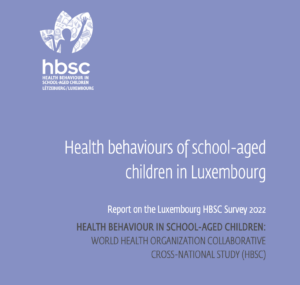Report on the Luxembourg HBSC Survey 2022
The Health Behaviour in School-aged Children (HBSC) Luxembourg health behaviour report has been published. Focusing on topics such as breakfast habits, nutrition, physical activity, weight status and body image, this report is the second of a series of thematic publications that will follow in the next months, based on the 2022 survey.
HBSC is an international survey collaboration under the aegis of the World Health Organization – Regional Office for Europe, counting with more than 50 countries and regions from Europe, North America and Asia. In Luxembourg, the HBSC study is undertaken in collaboration with the Ministry of Health and Social Security/Health Directorate, the Ministry of Education, Children and Youth and the Centre for Childhood and Youth Research (CCY), of the University of Luxembourg.
The survey is conducted every 4 years with pupils aged 11 to 18. In 2022, a representative sample of 9,432 pupils from 688 classes and 152 schools took part in the HBSC Luxembourg survey. This report documents findings in relation to health behaviours and health outcomes.
Main findings:
- Adolescents from a low family affluence background reported less often healhy behaviours. For instance, they were more likely to skip breakfast (38.5% reported to never have breakfast on weekdays, compared to 29.9% of those from high affluent families) and less likely to consume fruits and vegetables daily (18.9% vs 29.4%) and to practice daily moderate to vigorous physical activity (11.2% vs 21.0%). Similar social inequalities differences were already found in previous HBSC Luxembourg surveys, although the difference between adolescents from low and high affluence is widening since 2006.
- Boys were more often in overweight/obesity (23.0% vs 18.5% of girls), however girls more frequently evaluated themselves as too fat (41.7% vs 27.9% of boys). Although the prevalence of adolescents, and especially gilrs, in overweight/obesity is increasing since 2014, girls who self-evaluated as too fat decreased.
- Higher levels of physical activity were associated with better well-being. Although the level of well-being decrease with age (results from the Report Mental health and well-being of school-aged children in Luxembourg), highly active 17-18 years old reported better levels of well-being then their inactive peers aged 11-12.
The HBSC Luxembourg health behaviour report can currently be downloaded from the website www.hbsc.lu, in which interactive data visualization between 2006 and 2022 are also available. The following reports will also be available for download at the same website. They will focus on: Risk behaviours, such as substance consumption and physical fighting; Social context, including social support and school environment and; Trends over time and Covid-19 impact on adolescents’ health and well-being.

